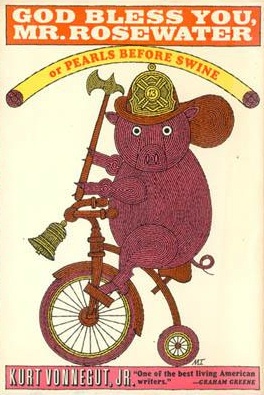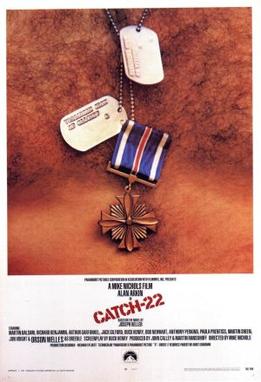
Catch-22 is a satirical war novel by American author Joseph Heller. He began writing it in 1953; the novel was first published in 1961. Often cited as one of the most significant novels of the twentieth century, it uses a distinctive non-chronological third-person omniscient narration, describing events from the points of view of different characters. The separate storylines are out of sequence so the timeline develops along with the plot.
Capt. John Yossarian is a fictional character, the protagonist of Joseph Heller's satirical 1961 novel Catch-22 and its 1994 sequel Closing Time. In Catch-22, Yossarian is a 28-year-old captain in the 256th Squadron of the Army Air Forces where he serves as a B-25 bombardier stationed on the small island of Pianosa off the Italian mainland during World War II. Yossarian's exploits have previously been thought to be based on the experiences of the author. Heller was also a bombardier in the Army Air Corps, stationed on an island off the coast of Italy during the war. Heller later documented in his autobiography "Now & Then" the elements of Yossarian which came from his experiences. Heller noted that he derived the name Yossarian from a wartime friend and fellow bombardier, Francis Yohannan. Yohannan made the military his career, continuing to serve through the Vietnam War, placing him at odds with Yossarian's feelings towards the military and as noted in his obituary "(Yohannan) turned aside calls from reporters who asked if he was the real-life Yossarian." A possible source for Yossarian's narrative adventure and efforts to be relieved of his combat duties is Lt. Julius Fish, another bombardier and wartime friend to both Francis Yohannan and Joseph Heller.

God Bless You, Mr. Rosewater, or Pearls Before Swine, Kurt Vonnegut's fifth novel, was published in 1965 by Holt, Rinehart and Winston and as a Dell mass-market paperback in 1970. A piece of postmodern satire, it gave context to Vonnegut's following novel, Slaughterhouse-Five and shared in its success.
Doc Daneeka is a fictional character in the 1961 novel Catch-22 by Joseph Heller. Doc Daneeka is the squadron physician and a friend of the novel's protagonist, Yossarian. "Catch-22" itself is first explained in the novel when Yossarian asks Doc Daneeka to excuse him from combat duty. Doc Daneeka is also the title of Chapter 4 of the novel.
Edward J. Nately III is a fictional character in Joseph Heller's satirical 1961 novel Catch-22.
Orr is a fictional character in the classic 1961 novel Catch-22 by Joseph Heller. Orr is a World War II bomber pilot who shares a tent with his good friend, the protagonist of the novel, Yossarian. Described as "a warm-hearted, simple-minded gnome," Orr is generally considered crazy. His most notable feature is repeatedly being shot down over water, but, until his final flight, always managing to survive along with his entire crew. On his final flight, perhaps two-thirds of the way through the novel, he is again shot down into the Mediterranean, and is lost at sea. Only in the last ten pages of the novel does Heller reveal that Orr's crashes were part of an elaborate plot to escape the war.
Major Major Major Major is a fictional character in Joseph Heller's 1961 novel Catch-22. He was named "Major Major Major" by his father, as a joke – passing up such lesser possibilities as "Drum Major, Minor Major, Sergeant Major, or C Sharp Major". Once he joined the army during World War II, he was quickly promoted to the rank of Major due to "an I.B.M. machine with a sense of humor almost as keen as his father's". His full name and rank are the title of chapter 9. He has an uncanny resemblance to real-life actor Henry Fonda, which scholar Philip D. Beidler calls "one of the novel's great absurd jokes".
Chaplain Captain Albert Taylor Tappman is a fictional character in Joseph Heller's 1961 novel Catch-22 and its 1994 sequel Closing Time. In earlier editions he was called Chaplain Robert Oliver Shipman, but this was changed to Albert Taylor Tappman. Editions published in some other territories, notably Britain, have continued to use the original name. Heller named the character after Charles Allan Tapman, a Penn State University boxer and Class of 1938 graduate that Heller met socially in the early 1950s.
Colonel Cathcart is a character in Joseph Heller's novel Catch-22 (1961) and the novel's de facto main antagonist.
Captain "Aarfy" Aardvark is a fictional character, a major antagonist in the 1961 novel Catch-22 by Joseph Heller. Aarfy is the plump navigator in Yossarian's B-25, noted for being oblivious to incoming flak, getting lost on missions, and his omnipresent pipe. His nickname "Aarfy" is an abbreviation of his surname, Aardvark.

A catch-22 is a paradoxical situation from which an individual cannot escape because of contradictory rules or limitations. The term was coined by Joseph Heller, who used it in his 1961 novel Catch-22.
The C.I.D. Investigators are characters in Joseph Heller's classic 1961 novel Catch-22.

Closing Time is a 1994 novel by Joseph Heller, written as a sequel to his popular 1961 novel Catch-22. It takes place in New York City in the 1990s and revisits some characters of the original, including Yossarian, Milo Minderbinder, and Chaplain Tappman.

Catch-22 is a 1970 American satirical black comedy war film adapted from the 1961 novel of the same name by Joseph Heller. In creating a black comedy revolving around the "lunatic characters" of Heller's satirical anti-war novel set at a fictional Mediterranean base during World War II, director Mike Nichols and screenwriter Buck Henry worked on the film script for two years, converting Heller's complex novel to the medium of film.
Scheisskopf is a minor fictional character in the 1961 novel Catch-22 by Joseph Heller, who is promoted through the ranks from Lieutenant to First Lieutenant, Colonel and finally to Lieutenant General. Lieutenant Scheisskopf is the title of Chapter Eight and General Scheisskopf is the title of Chapter Thirty-seven. Scheisskopf is a parade-obsessed ROTC graduate and training officer at the Air cadet base where Yossarian and Clevinger are trained before being sent overseas. Later Scheisskopf is himself transferred overseas to General Peckem’s command.

Joseph Heller was an American author of novels, short stories, plays, and screenplays. His best-known work is the 1961 novel Catch-22, a satire on war and bureaucracy, whose title has become a synonym for an absurd or contradictory choice. He was nominated in 1972 for the Nobel Prize in Literature.
Catch-22 is a satirical play by the American author Joseph Heller, first produced in 1971 and based on his 1961 novel of the same name.

Face of a Hero is a novel written by American writer Louis Falstein and published in 1950. Though out of print for a long time, interest in this narrative, dealing with the war experience of a B-24 tail gunner in Southern Europe during the Second World War was rekindled when it was suggested that it inspired Joseph Heller while writing his well-known war novel Catch-22.

Catch-22 is a satirical dark comedy miniseries based on the 1961 novel of the same name by Joseph Heller. It premiered on May 17, 2019, on Hulu in the United States. The series stars Christopher Abbott, Kyle Chandler, Hugh Laurie, and George Clooney, who is also an executive producer alongside Grant Heslov, Luke Davies, David Michôd, Richard Brown, Steve Golin, and Ellen Kuras. The series was written by Davies and Michôd and directed by Clooney, Heslov, and Kuras, with each directing two episodes.